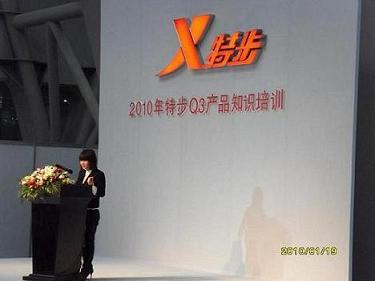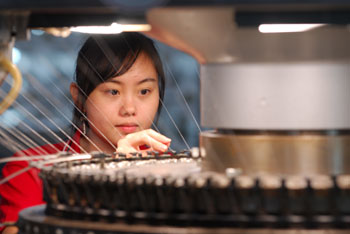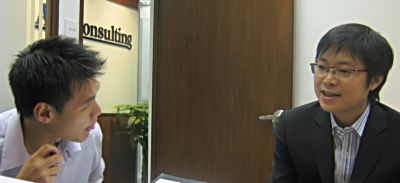
There is evidence of a strong recovery of the textile industry since the end of last year. The National Bureau of Statistics of China has reported that the industry added value for the first four months of the year increased by 12.4% YoY, backed by strong domestic demand as retail sales of textiles and garments surged 23.3% YoY.
This growth rate was 5.2 percentage points higher than the general growth rate of consumer goods. (Source: National Bureau of Statistics of China)
The recovery rode on the upturn of China’s economy since the financial crisis in 2008/2009. The World Bank has raised its forecast of China’s GDP growth for 2010 to 9.5% in March 2010, which is much higher than the forecast of 7.7% made in June 2009 and 8.7% in November 2009. (Source: World Bank)
Among the largest textile players listed on the Singapore Exchange, China Gaoxian is principally engaged in the production of polyester fibre.
Sales in 1Q2010 increased 9.8% to RMB460.0 million with a stable high gross profit margin of 31.8%.
Li Heng, a nylon yarn producer, saw a YoY sales growth of 20.3% to RMB568.3 million. As one of the leading manufacturers of performance fabrics, China Taisan grew its sales by 51.0% to RMB302.5 million in 1Q2009.
| 1Q2010 RMB’m |
1Q2009 RMB’m |
Change | Close Price on 06/04/10 S$ |
P/E Ratio as at 06/04/10 Times |
|
| Li Heng | 568.3 | 472.5 | 20.3% | 0.220 | 10.14 |
| China Gaoxian | 459.8 | 418.7 | 9.8% | 0.165 | 2.46 |
| China Sky | 438.4 | 176.4 | 148.5% | 0.165 | Nil |
| China Taisan | 302.5 | 200.3 | 51.0% | 0.185 | 6.48 |

With such good results from some S-Chips players in the textile industry, can we expect the high margin and profitability of these S-Chips to be maintained for the rest of the year?
The momentum of the textile industry recovery in the short term lies in the supply and demand of upstream and downstream sectors, as well as the capacity and utilization.
Stocks of upstream raw materials such as PTA and PET have been maintained at a high level since the second half of last year while the operating rate of PTA plants and PET plants have been 90.0% and 76.5%, respectively. (Source: Global Professional Textile Market)
There maybe supply constraints on raw materials due to the relatively low operating rate of PET plants and reduced imports as a result of government anti-dumping policies.
Nevertheless, major players have a certain bargaining power to pass on the rising price of raw materials to customers. The demand for textiles from downstream garment sector continues to rise.

Large sports and lifestyle brands are taking the cue from China's investments in sports facilities and its hosting of international sporting events such as the Guangzhou Asian Games 2010.
During the 2010 fourth-quarter Trade Fair held in May, domestic sports brands like Li Ning, Anta, Xtep, and China Dongxiang recorded a steadily growth in order book value compared with the same period of last year.
Although there are growing pressures which slow down textile exports from renminbi revaluation and European debt crisis, domestic oriented players like China Gaoxian and China Taisan expect to continue to do well.
China Gaoxian has a strong rolling order book of RMB300.0 million at present, which points to a utilization rate of nearly 80% for the second quarter of this year.
Meanwhile, China Gaoxian is in the process of rapid expansion of its production capacity. Its premium differentiated yarn and high margin warp knit fabric capacity will expand 1.3 times and 4.8 times, respectively, by end FY2010.

The production utilization rate of China Taisan will also stay above 85% given its high order book of RMB247.0 million.
In the long term, the performance of textile companies hinges on product differentiation, technology and equipment renovation, and brands building.
China Gaoxian has an advantage in the aspects of premium differentiated polyester yarns, the ASPs of which are on average 10.0-25.0 percentage points higher than generic yarns.
On the technology front, China Taisan planned to invest RMB20.0 million in R&D programmes at China’s best textile university - Wuhan University of Science and Engineering - to develop 25 new fabric products over next 5 years.
China Taisan has also maintained a long-term relationship with Taiwan Institution of Technology. Meanwhile, China Taisan searches for downstream M&A opportunities so as to offer not only fabric design, but also apparel design which can lead to expanded profit margins.
Recent story: CHINA TAISAN, CHINA GAOXIAN, LI HENG: Riding high on industry recovery






